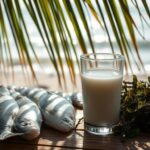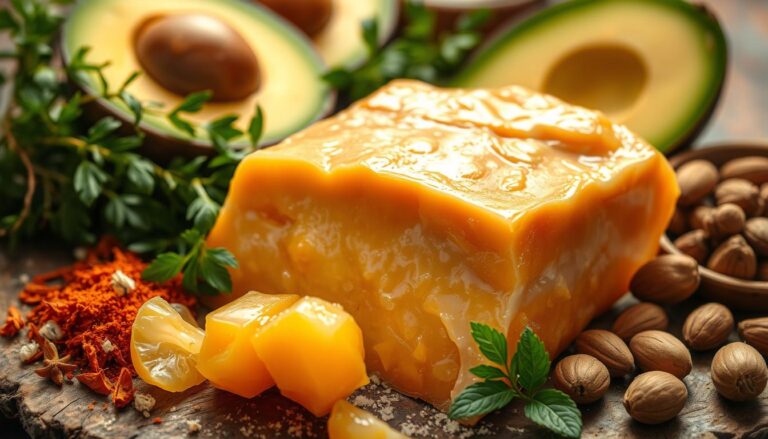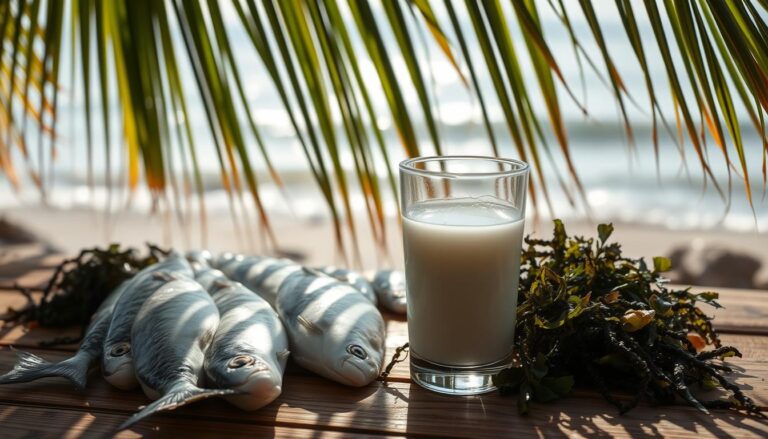Pork fat is not just any fat; it’s a superfood that’s packed with nutrients. It’s in the top 10 list of the most nutritious foods globally. This fat is not only a source of healthy fats but also vitamins and minerals.
Its nutritional profile is exceptional, making it a great addition to any diet. It’s a game-changer for those looking to improve their health.
Key Takeaways
- Pork fat is ranked among the top 10 most nutritious foods globally.
- It is a rich source of healthy fats, vitamins, and minerals.
- Pork fat has been used in culinary traditions around the world for its versatility and flavor.
- This nutrient-dense food offers potential benefits for brain and heart health.
- Utilizing pork fat can have sustainable and economic advantages.
Understanding Pork Fat: A Nutritional Powerhouse
Pork fat is often ignored today, but it’s a superfood full of good stuff. It includes everything from lard to fatback. These ingredients have been key in cooking around the world.
Types of Pork Fat: From Lard to Fatback
Pork fat has many forms, each with its own uses. Lard, the pig’s fat, is loved for its taste and cooking ability. Fatback, the fat under the skin, adds richness and texture to food.
Chemical Composition and Nutritional Profile
Pork fat is rich in omega-3 fatty acids and other good fats. It’s also packed with vitamins and minerals like A, D, E, zinc, and iron. This makes it a nutrient-dense food.
Historical Use Across Cultures
Pork fat has a rich history, used in many cultures for centuries. It’s in European pastries and Asian stir-fries. Its versatility and importance in food are clear.
| Pork Fat Type | Composition | Culinary Uses |
|---|---|---|
| Lard | High in monounsaturated fats, with a balanced omega-6 to omega-3 ratio | Frying, baking, sautéing, and adding rich flavor to dishes |
| Fatback | High in saturated fats, providing a firm texture and distinct pork flavor | Curing, rendering, and adding texture to various preparations |
https://www.youtube.com/watch?v=9t38GRin1cg&pp=ygUGI2NkZGF5
This fat is in the top 10 most nutritious foods in the world .. https://timesof
A recent report by the Times of India puts pork fat in the top 10 most nutritious superfoods globally. This ranking shows how rich in nutrients this nutrient-dense food is.
The Times of India looked at several factors to pick the world’s healthiest foods. They considered:
- Caloric density
- Vitamin and mineral content
- Antioxidant levels
- Presence of essential fatty acids
- Protein and fiber content
Pork fat stood out as a superfood in this evaluation. It has lots of monounsaturated and saturated fats. It also has a lot of vitamins A and D.
“Pork fat is a surprisingly versatile and nutritious ingredient that has been unfairly maligned in recent decades. This report from the Times of India helps to rehabilitate its reputation as a true superfood.”
This ranking shows pork fat’s nutritional value. It also shows its growing importance in a healthy diet.
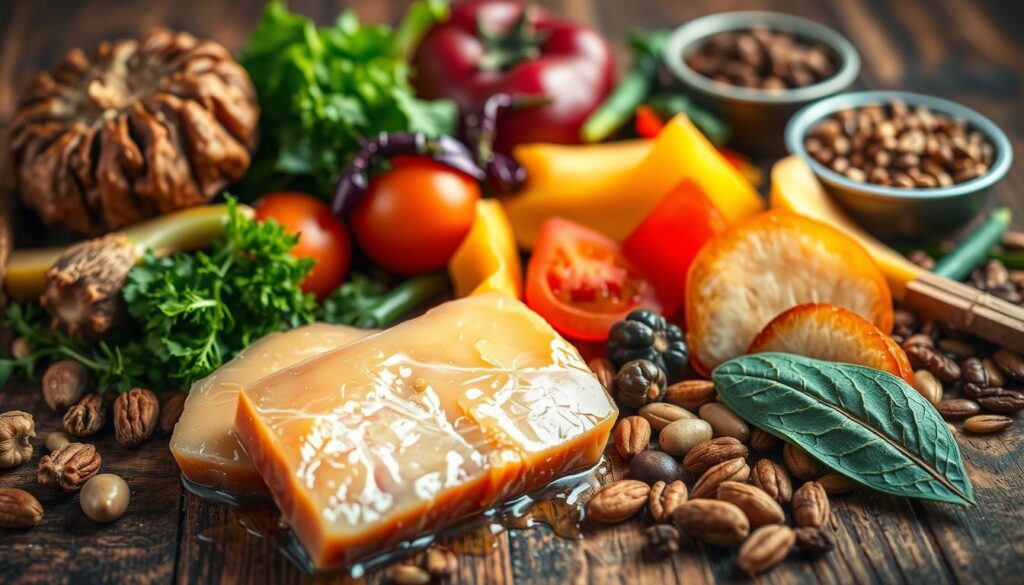
The Science Behind Pork Fat’s Health Benefits
Pork fat, also known as lard or fatback, is packed with nutrients. It’s full of essential fatty acids, vitamins, and minerals. This makes it a great addition to a healthy diet. Let’s explore why pork fat is so good for us.
Rich Source of Essential Fatty Acids
Pork fat is a top source of omega-3 fatty acids. These fats are key for staying healthy. They help lower inflammation, boost brain function, and support heart health. Plus, pork fat has a good mix of monounsaturated and saturated fatty acids, making it very nutritious.
Vitamin and Mineral Content
Pork fat is more than just healthy fats. It’s also full of important vitamins and minerals. It’s especially rich in vitamin D, which is great for bones and the immune system. It also has vitamin E, an antioxidant, and vitamin B12, which helps make energy and red blood cells.
Anti-inflammatory Properties
Studies show that pork fat has anti-inflammatory benefits. Its fatty acid mix, including oleic acid, can lower body inflammation. This is good for conditions like arthritis, heart disease, and metabolic issues.
| Nutrient | Amount per 100g of Pork Fat |
|---|---|
| Calories | 900 kcal |
| Total Fat | 100g |
| Saturated Fat | 39g |
| Monounsaturated Fat | 45g |
| Polyunsaturated Fat | 11g |
| Vitamin D | 6μg |
| Vitamin E | 1.1mg |
| Vitamin B12 | 1.3μg |
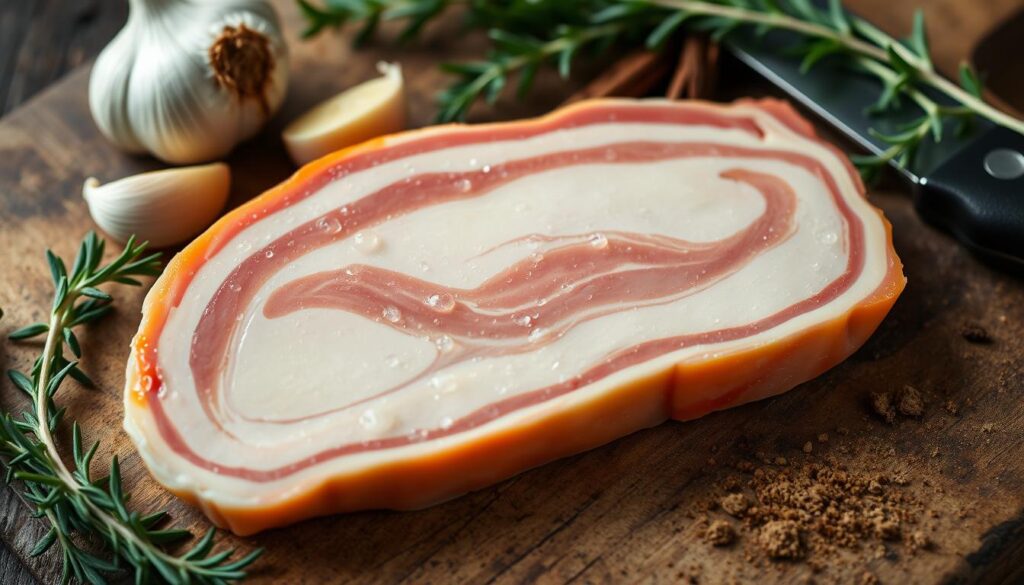
Culinary Applications and Cooking Benefits
Pork fat, also known as lard, is a versatile and flavorful ingredient. It has been valued in cooking traditions worldwide. This food is not just a simple fat for cooking; it offers many benefits.
Pork fat can make a wide range of dishes taste better and feel richer. It’s great for searing steaks, roasting veggies, or baking flaky pastries. Its high smoke point is perfect for high-heat cooking, leading to beautifully browned foods.
Pork fat is also packed with healthy fats and nutrient-dense foods. It has essential fatty acids that help with heart health and the immune system. Plus, it’s a natural source of vitamins A, D, E, and K, making it even more nutritious.
| Culinary Use | Benefit |
|---|---|
| Searing and frying | High smoke point, crisp texture |
| Roasting and baking | Flaky, buttery texture |
| Seasoning and flavoring | Rich, savory depth of flavor |
Whether you’re a pro chef or a home cook, pork fat can change your cooking game. It boosts the taste of your dishes and adds nutritional value. This ingredient is a true culinary gem worth trying.
Pork Fat’s Role in Brain and Heart Health
Pork fat is more than just a cooking ingredient. It’s a nutritional powerhouse that boosts brain and heart health. It’s packed with essential fatty acids, including omega-3s, which are key for brain function and heart health.
Cognitive Function Enhancement
Eating pork fat can improve brain health and cognitive performance. The omega-3 fatty acids in pork fat are vital for brain structure and function. They reduce inflammation, boost communication between brain cells, and enhance memory and learning.
Studies show that pork fat in the diet leads to better cognitive scores and focus. It also lowers the risk of age-related brain diseases like Alzheimer’s. The mix of nutrients in pork fat, including vitamins and antioxidants, adds to its brain-protective benefits.
Cardiovascular Benefits
Pork fat is not just for cooking; it’s good for the heart too. While saturated fats can raise cholesterol, pork fat’s monounsaturated and polyunsaturated fats are heart-friendly. They lower heart disease risk by reducing inflammation and improving blood lipid profiles.
The vitamin E and selenium in pork fat also protect the heart. Adding pork fat to a healthy diet can offer cognitive and cardiovascular benefits.
Sustainable and Economic Benefits of Using Pork Fat
Pork fat, also known as lard, is more than just a cooking ingredient. It has been a key part of many cuisines for years. Its benefits go beyond the kitchen, offering both sustainability and cost savings.
Pork fat is great for weight management. It’s full of healthy fats that can help you feel full. This makes it a helpful part of a balanced diet for keeping a healthy weight.
- Pork fat is a renewable and sustainable resource, as it is derived from the natural processing of pork.
- Utilizing pork fat can reduce food waste, as it repurposes a byproduct that would otherwise be discarded.
- The economic benefits of using pork fat are significant, as it is typically a more cost-effective alternative to other cooking oils and fats.
Pork fat is incredibly versatile in cooking. It’s great for sautéing, frying, baking, and roasting. Using pork fat can make your dishes taste better and be more nutritious. It’s a win-win for both home cooks and professional chefs.
“Pork fat is a gift from the culinary gods, offering both delicious flavor and remarkable nutritional benefits.”
Exploring pork fat shows it’s a valuable ingredient for today’s kitchens. Its benefits are clear, making it a must-have for anyone who loves to cook.
Conclusion
Pork fat is a true superfood and one of the top 10 most nutritious foods in the world. It’s packed with essential fatty acids, vitamins, and minerals. This makes it a powerhouse for our health and well-being.
It boosts cognitive function and supports heart health. Adding pork fat to our diets is a smart move.
It’s time to change how we see pork fat. It’s not just a fat; it’s a nutrient-dense food. By understanding its value, we can explore new recipes and live healthier.
Let’s break free from old stigmas. Discover the benefits and versatility of this superfood.
The facts are clear: pork fat is a remarkable food. It’s time to include it in our diets. By doing so, we can add nutritional richness to our lives and look forward to a healthier future.



